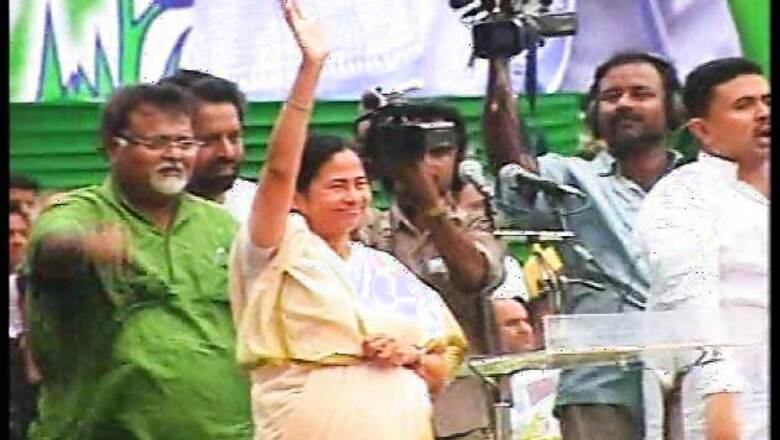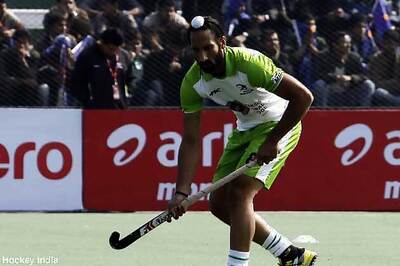
views
The allegations against Mamata Banerjee that her preoccupation with West Bengal politics is preventing her from giving greater attention to the Railways ministry have reopened the question whether regional leaders are capable of discharging national responsibilities.
The grimness of available statistics shows how remiss she has been in her ministerial duties. In the period that she has been in office, there have been 11 accidents, including five major ones, killing 300 people. In addition, there was a stampede at the New Delhi railway station, in which a woman and a young boy were killed.
Yet she has been quite indifferent to charges of a virtual dereliction of duty in view of her frequent absence from her office in the national capital. As a result, 85,100 safety-related posts remain vacant as the files are not signed.
She is also quite nonchalant about her neglect of the ministry presumably because she is confident about the stability of her base in the state. She can, therefore, say that being the "railway minister is not my true identity. My prime identity is that I am a citizen of West Bengal and, hence, my prime duty is to work for West Bengal".
That "work" consists, of course, of preparing the ground for ousting the state's Left Front government by building up her party, the Trinamool Congress, through intensive campaigns. One of these was in evidence last Wednesday when a massive crowd attended a rally convened by her in Kolkata.
On the same day, however, the media carried the Comptroller and Auditor General's (CAG) damning report on her performance. It said the railways had failed to modernise signalling equipment and install anti-collision devices. True these failures extend back to the tenures of Mamata's predecessors in the ministry. But still, she cannot be absolved of the blame of not taking urgent corrective measures.
It is because the regional leaders have a restricted outlook that they are routinely denied crucial portfolios like home, finance and external affairs, which require administrative acumen, knowledge of the monetary world and an understanding of the diplomatic scene.
Both the Bharatiya Janata Party (BJP), which led the National Democratic Alliance (NDA), and the Congress, which currently leads the United Progressive Alliance (UPA), have kept these ministries with themselves. As national parties whose influence is not confined to a single state, as in the Trinamool Congress' case, they have a much wider vision.
The furore which George Fernandes created when he was defence minister in the NDA government by describing China as India's "enemy No. 1" shows how a regional politician - Fernandes belonged to the Bihar-based Janata Dal-United (JD-U) - can veer off at a tangent on sensitive issues.
Similarly, it is not difficult to imagine the problems which the Tamil Nadu-based DMK will cause if it is asked to handle the external affairs ministry in view of its known sympathies for the Tamil separatists in Sri Lanka.
The railways, of course, do not call for comments or the formulation of policies on foreign nations. But it is nevertheless a massive undertaking since it is the largest such network in Asia and the second largest in the world, carrying nearly 2 million passengers and two million tonnes of freight daily.
However, as the CAG report has indicated, lack of modernisation has not only made it accident-prone but also made it fall behind other railways in terms of speed and amenities. Except for special trains meant mainly for the affluent like the Rajdhani and Shatabdi expresses, the speeds rarely touch 100 kmph unlike 300 kmph in Europe and Japan while the passenger amenities remain minimal in ordinary trains.
It is obvious that Mamata Banerjee would have given a huge boost to her political career if she had concentrated on her responsibilities as a minister and brought about a perceptible improvement in the functioning of the railways. Instead, by virtually washing her hands off her duties - "railway minister is not my true identity" - she seems to have damaged her own prospects to a considerable extent where discerning voters are concerned.
Yet, the callousness, which amounts to a virtual insult to the dead and the injured, is not surprising. Having lived all her life in West Bengal (unlike, say, Finance Minister Pranab Mukherjee, who has been based mostly at the Centre) and concentrating solely on fighting the Communist Party of India-Marxist's (CPI-M) gargantuan and ruthless party machine, which has targeted her physically more than once, Mamata has little time for anything else, especially now when she feels she is on the verge of electoral success.
After the reverses suffered by the CPI-M in the parliamentary, panchayat and municipal polls, Mamata is convinced that the chief minister's post is within her reach. But another railway accident can give a severe jolt to her ambitions. It is this possibility which makes her allege that the CPI-M may be behind the recent mishap.
The best course for her will be to resign. But she evidently believes that the power and pelf of a central ministry is necessary for confronting the Marxists in West Bengal. What this attitude emphasises is her awareness that a role on the national stage enhances her stature, but she still remains tethered to her region. To her, the ministry in distant Delhi is apparently no more than a perquisite to be enjoyed, but which entails no responsibility.

















Comments
0 comment